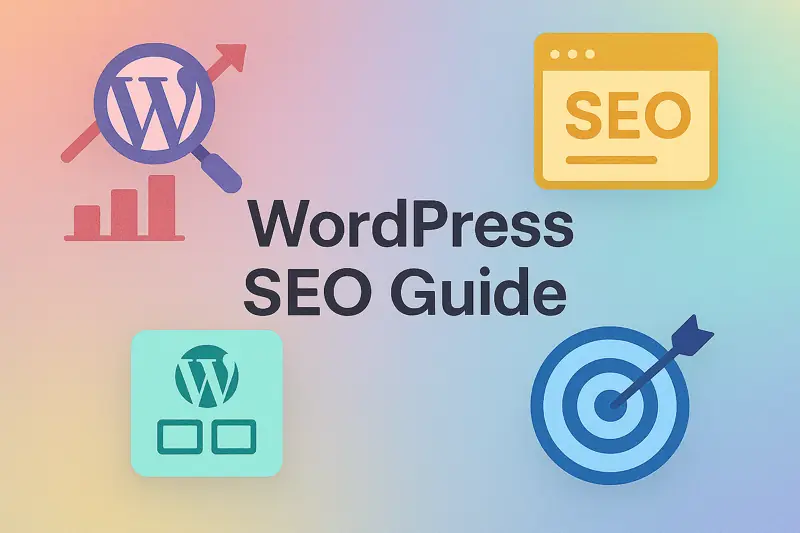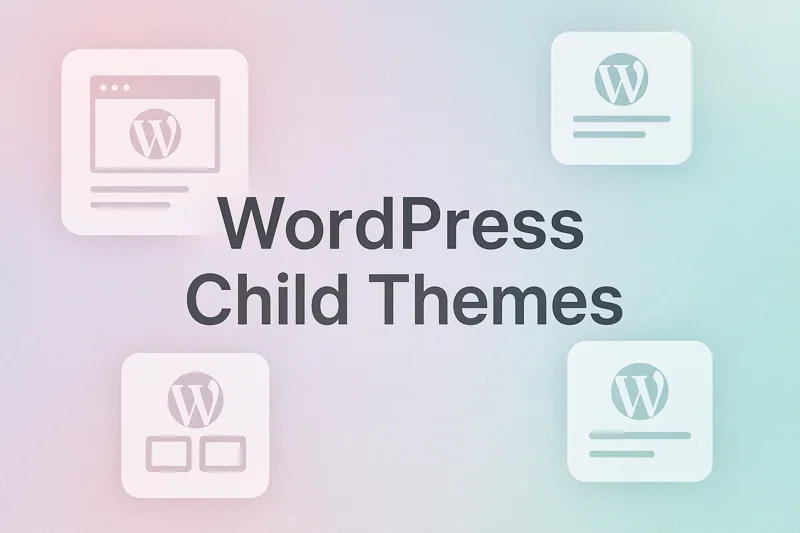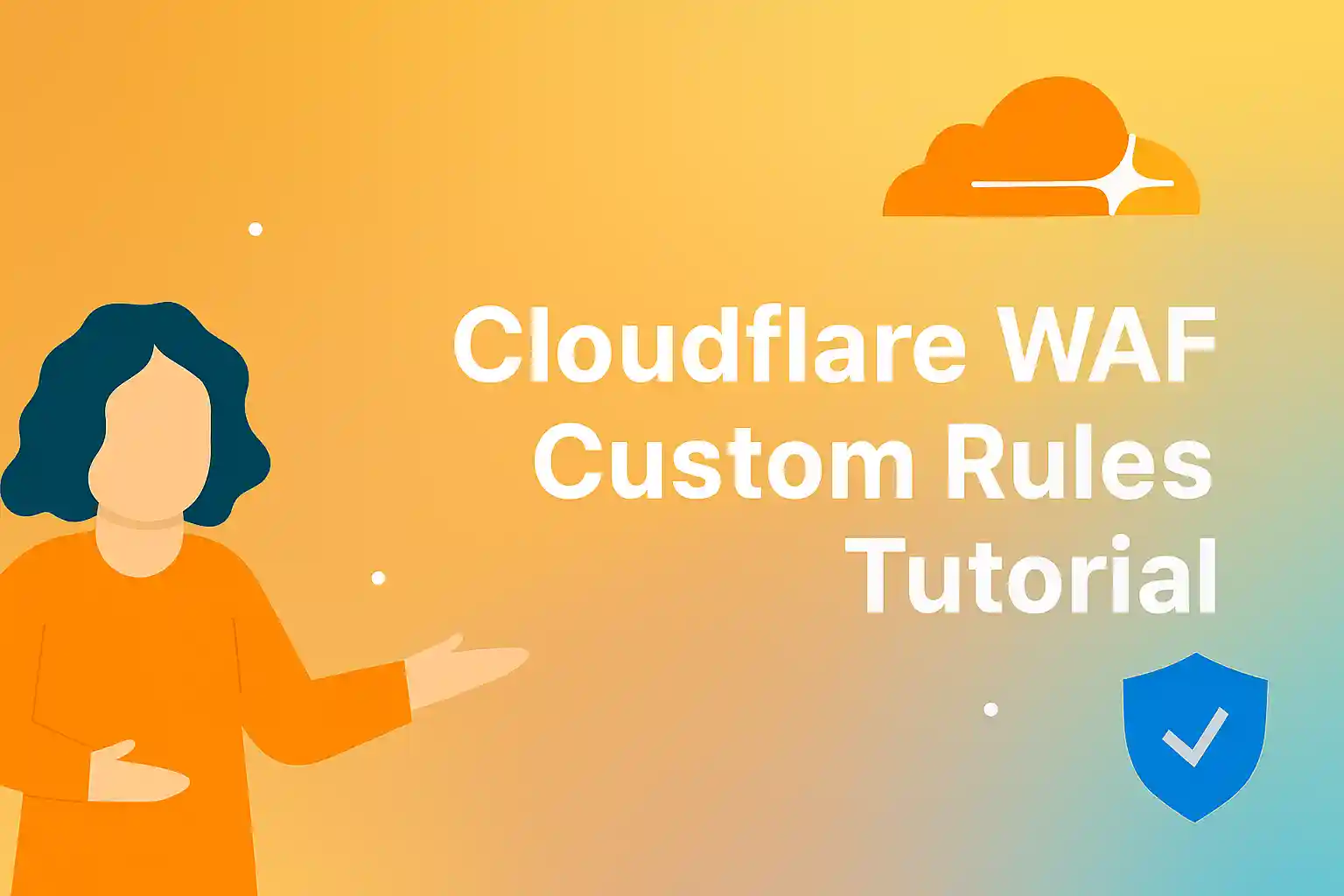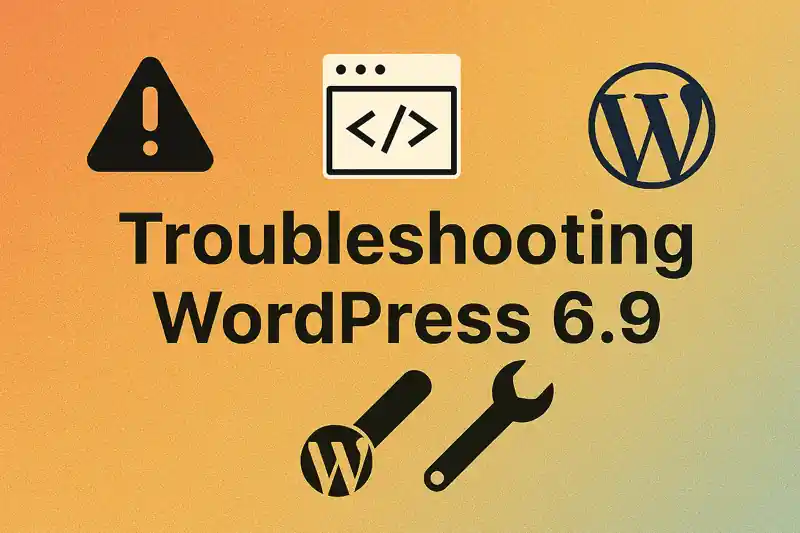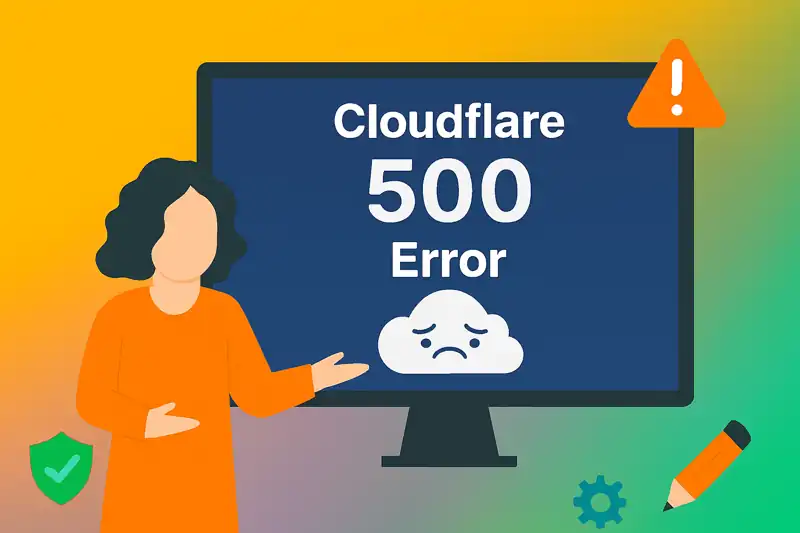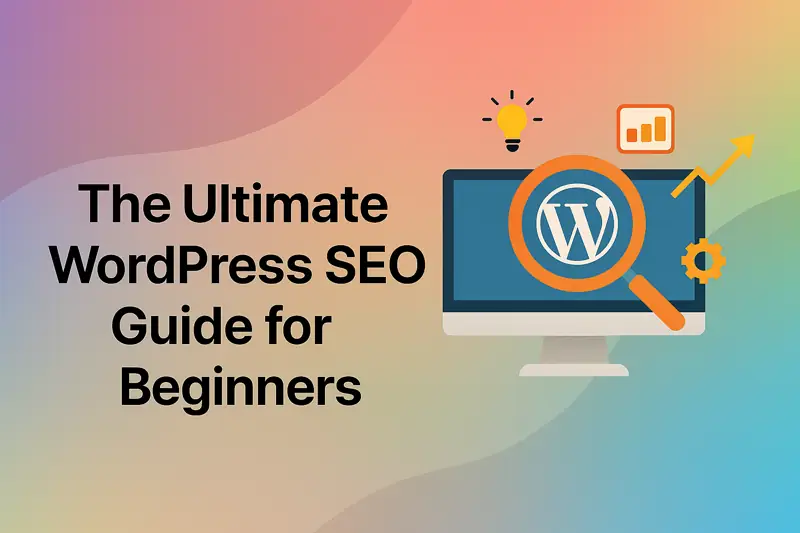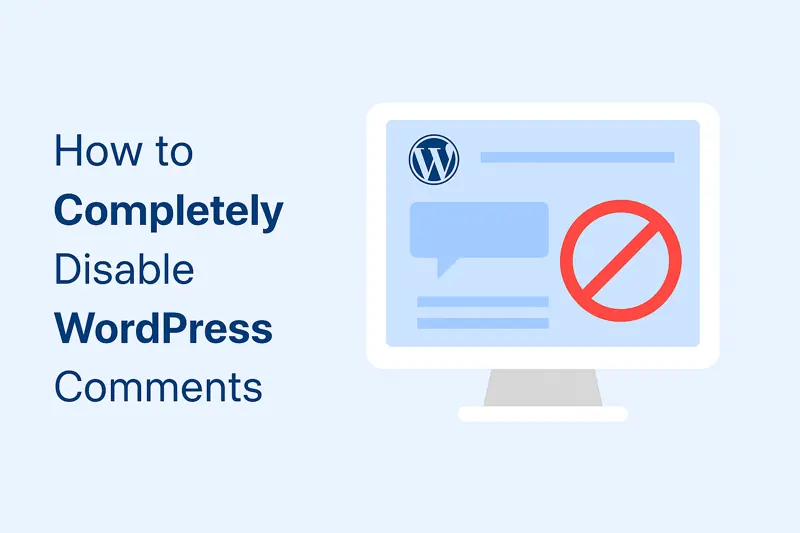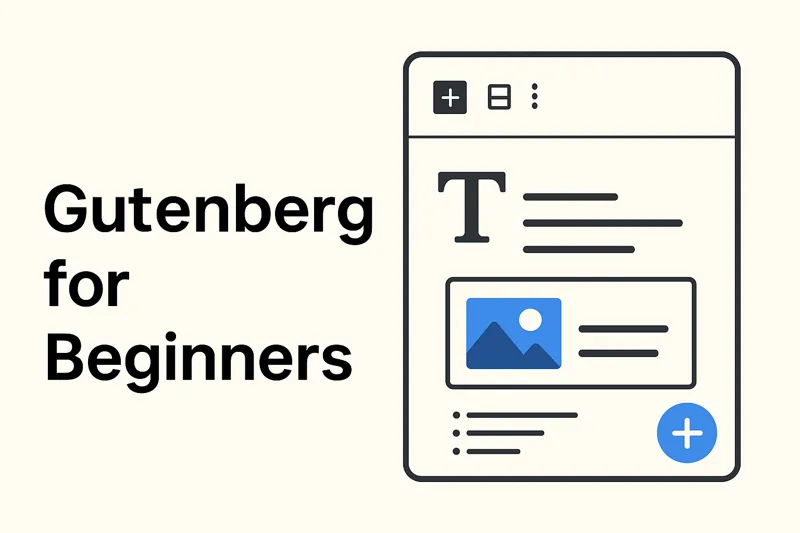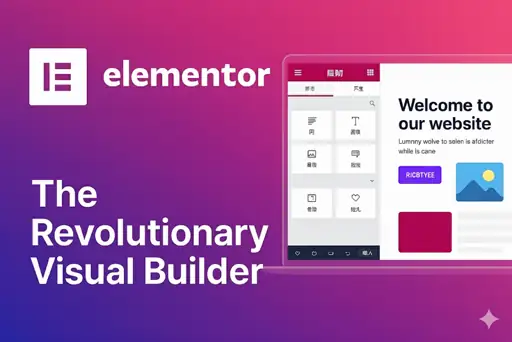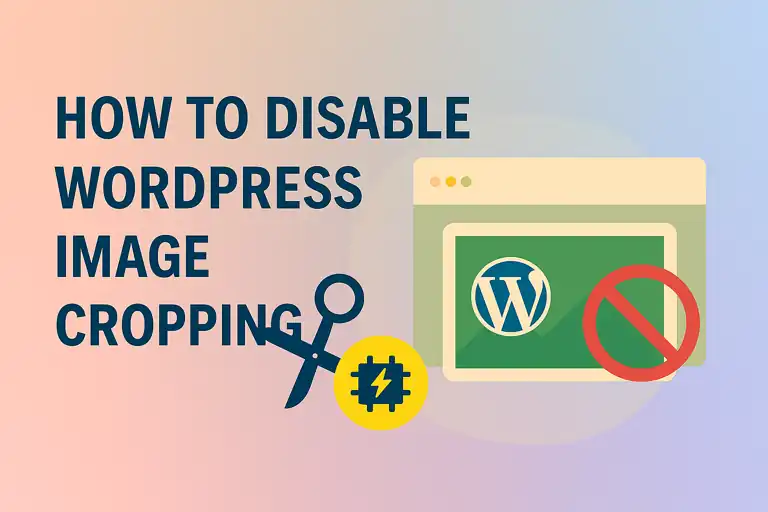What is WordPress?
WordPress is a leading global open-source Content Management System (CMS), originally released in 2003 as a blogging platform. It is developed using the PHP language and typically works in conjunction with a MySQL or MariaDB database. With its user-friendly interface and powerful features, WordPress has evolved into a flexible platform capable of creating various types of websites, from simple personal blogs to complex corporate portals and e-commerce stores.
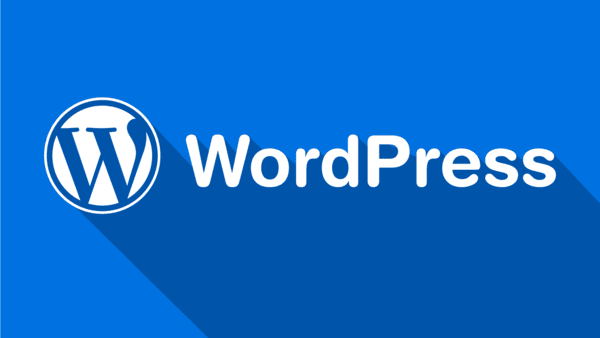
History and Development of WordPress
- Origin (2003): WordPress was initially created by Matt Mullenweg and Mike Little as a fork of b2/cafelog, a blogging software whose development had been discontinued. Its first version (WordPress 0.7) was released on May 27, 2003.
- Early Development: Early versions focused on enhancing the blogging experience, introducing features like a plugin architecture, a more user-friendly interface, and permalinks.
- Evolution into a CMS (2005-Present): With the introduction of the theme system and page functionality, WordPress began to transcend being purely a blogging platform, gradually evolving into a full-fledged content management system. Key milestones include:
- Theme System: Allows users to easily change the website’s appearance without modifying core code.
- Plugin System: Enables developers to extend WordPress functionality, making it possible to achieve almost any imaginable feature.
- Widgets: Simplified the process of adding content and functionality to areas like sidebars.
- Custom Post Types and Custom Taxonomies: Greatly enhanced WordPress’s flexibility as a CMS, enabling it to manage various types of content.
- REST API: Allows WordPress to interact with other applications and services, becoming a more powerful application platform.
- Gutenberg Block Editor: Introduced a modern, block-based content editing experience, making content creation more flexible and intuitive.
- Current Status: WordPress is currently the world’s most popular website-building platform, powering over 40% of all websites on the internet. Its continuous development relies on a vast and active global community of developers, designers, content creators, and regular users.
Core Advantages of WordPress
- Open Source: WordPress is open-source software released under the GNU General Public License (GPL). This means anyone can freely download, use, modify, and distribute WordPress. This openness promotes transparency, collaboration, and innovation.
- Free: The WordPress software itself is completely free. You only need to pay for domain registration and web hosting (for self-hosted WordPress.org).
- Easy to Use: WordPress is renowned for its intuitive user interface. Even without programming knowledge, users can easily create and manage content, install themes and plugins, and configure website settings. Its dashboard is clearly designed, and the learning curve is relatively gentle.
- Strong Community: WordPress has a vast and active global community. This means you can easily find a wealth of tutorials, documentation, forum support, and professional developers and designers. When you encounter problems, help is always available.
- Rich Plugins and Themes:
- Themes: Tens of thousands of free and premium themes are available, covering various design styles and industry needs. You can easily change the overall look and layout of your website.
- Plugins: Over 50,000 free plugins (and many more premium ones) are available to extend WordPress functionality, such as SEO optimization, security enhancements, contact forms, social media integration, e-commerce, and more.
WordPress.org vs. WordPress.com
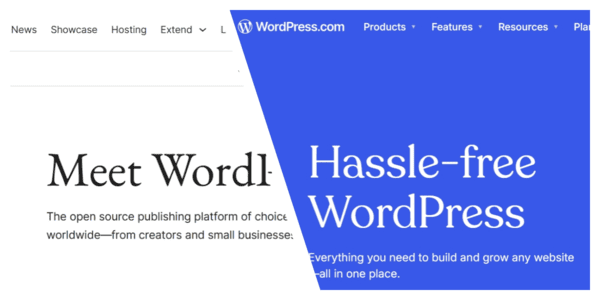
Beginners are often confused about WordPress.org and WordPress.com. Simply put:
- WordPress.org: This is where you can download the WordPress software itself. It’s self-hosted WordPress. You need to purchase your own domain name and web hosting service, then install the WordPress software on your host. It offers complete control and flexibility.
- WordPress.com: This is a hosted service provided by Automattic, a company founded by WordPress co-founder Matt Mullenweg. It uses the WordPress software but handles hosting and other technical aspects for you. It offers free and paid plans.
Feature Comparison
| Feature | WordPress.org (Self-hosted) | WordPress.com (Hosted Service) |
|---|---|---|
| Software Access | Free download of WordPress core software | No download needed, register an account to start |
| Web Hosting | User chooses and purchases third-party hosting | Provided by WordPress.com (different plans have different limits) |
| Domain Name | Can use any custom domain name | Free version uses a subdomain (e.g., yourname.wordpress.com), paid versions can use a custom domain |
| Themes | Can install any free, premium, or custom-developed theme | Free version has limited choices, paid versions offer more, but custom theme uploads might be restricted (unless on a high-tier plan) |
| Plugins | Can install any free or premium plugin | Free and lower-tier plans cannot install plugins; only higher-tier (Business/eCommerce) plans support plugin installation |
| Custom Code | Full control, can modify PHP, CSS, JavaScript code | Usually not allowed or strictly limited (unless on a high-tier plan) |
| Site Control | Complete control over site data, files, and code | Limited control, subject to WordPress.com’s terms of service |
| Maintenance | User responsible for updates, backups, security | WordPress.com handles most technical maintenance, backups, and basic security |
| Monetization | Complete freedom to run any ads, e-commerce, etc. | Free version displays WordPress.com ads; restrictions on custom ads; e-commerce usually requires paid plans |
| Storage Space | Depends on the purchased hosting plan | Different plans offer different storage space |
| Technical Skill | Requires some basic website management knowledge | Lower technical requirement, more suitable for beginners |
| Cost | Domain fee + Hosting fee + (Optional) Premium themes/plugins | From free to various tiered paid plans |
Applicable Scenarios
- WordPress.org (Self-hosted) Use Cases:
- Users who need complete control over website design and functionality.
- Developers or businesses wanting to install custom themes and plugins.
- Those planning to monetize their site (e.g., ads, e-commerce) and want full control.
- Complex websites requiring advanced features, customization, or integration with other systems.
- Users who don’t mind managing their own site updates, backups, and security.
- Examples: Professional bloggers, small to medium-sized business websites, complex online stores, online course platforms, membership sites.
- WordPress.com (Hosted Service) Use Cases:
- Beginners who want to quickly set up a simple website or blog.
- Users who don’t want to deal with web hosting, technical maintenance, and security issues.
- Personal blogs, hobby groups, or small projects with modest functional and customization needs.
- Those with limited budgets who can accept the limitations and subdomain of the free plan.
- Examples: Personal diaries, hobby sharing, simple informational websites, testing WordPress features.
How to Choose
Choosing between WordPress.org and WordPress.com depends on your specific needs, technical skills, and budget:
- For complete control, flexibility, and future scalability: Choose WordPress.org. Although it requires more initial time and effort for setup and management, it offers limitless possibilities in the long run.
- For ease of use, a quick start, and no technical maintenance: Choose WordPress.com. It’s a good starting point, especially for beginners who just want to focus on content creation. You can start with the free plan and upgrade to a paid plan if you need more features.
A common piece of advice: If you are serious about your website and want it to grow long-term, WordPress.org is usually the better choice. If you just want to try things out or have very simple needs, WordPress.com will be more convenient.
Why Choose WordPress for Website Building?
In addition to the core advantages mentioned earlier, here are other important reasons to choose WordPress for building your website:
Flexibility and Scalability/Extensibility
- Adapts to Various Needs: The WordPress core is very lightweight, but through themes and plugins, it can be molded into almost any type of website. Whether it’s a simple blog or a complex e-commerce platform, social network, or corporate portal, WordPress can handle it.
- Massive Theme Selection: You can choose from tens of thousands of free and premium themes to quickly change your website’s visual appearance and user experience to match your brand or personal style.
- Powerful Plugin Ecosystem: Need a specific function? There’s likely a plugin for it. From SEO optimization, security protection, form building, social media integration to online payments, plugins can do almost anything.
- Custom Development: For users or developers with technical skills, WordPress offers a high degree of customizability. You can create your own themes and plugins or modify existing code to meet unique requirements.
- Scalability: WordPress can scale well as your website traffic and content volume grow. By choosing the right hosting service and performing performance optimizations, WordPress can handle a large number of visits.
SEO (Search Engine) Friendly
WordPress itself is built with some fundamental Search Engine Optimization (SEO) principles in mind:
- Clean Permalink Structure: You can customize URL structures to include keywords, making them more SEO-friendly.
- Good Code Structure: WordPress generates relatively standard and clean code, which is easy for search engine crawlers to understand.
- Easy Content Optimization: You can easily add titles, meta descriptions, image ALT tags, etc., for each post and page.
- SEO Plugins: Powerful SEO plugins like Yoast SEO or Rank Math can greatly help you optimize website content, generate sitemaps, manage redirects, and further improve your site’s ranking in search engines.
- Mobile-Friendly: Most modern WordPress themes are responsive, adapting well to various devices (desktops, tablets, phones), which is crucial for both SEO and user experience.
- Fast Loading Speed: By choosing good hosting, optimizing images, and using caching plugins, you can significantly improve the loading speed of a WordPress site, which is also an important ranking factor.
Wide Range of Applications
WordPress’s versatility makes it suitable for various types of website projects:
- Blogs: WordPress’s origin, still one of the best platforms for creating and managing personal blogs, news blogs, industry blogs, etc.
- Corporate Websites: Many large, medium, and small businesses use WordPress to display company information, products/services, news updates, contact details, etc.
- E-commerce: With powerful e-commerce plugins like WooCommerce, you can easily build fully functional online stores to sell physical or digital goods.
- Forums: Using bbPress or other forum plugins, you can establish community forums on your WordPress site.
- Portfolio Sites: Designers, photographers, artists, etc., can use WordPress to showcase their work.
- News & Magazine Sites: Many online news and magazine websites use WordPress because it’s easy to publish and manage large amounts of content.
- Education Platforms/Online Courses (LMS – Learning Management Systems): With plugins like LearnDash or LifterLMS, WordPress can be turned into an online learning platform.
- Membership Sites: You can create content areas accessible only to members, offering paid subscription services.
- Non-profit Websites: Many non-profit organizations use WordPress for advocacy, fundraising, and engaging with supporters.
- Event Sites: Can publish event information, sell tickets online, etc.
Prerequisites for This Tutorial
To successfully learn this tutorial and start your WordPress journey, it’s recommended that you have the following basics:
Basic Computer Skills
- Familiarity with using a mouse and keyboard.
- Ability to create, save, copy, and paste files and folders.
- Know how to open and use a web browser (like Chrome, Firefox, Edge, Safari).
- Basic typing skills.
Basic Understanding of the Internet
- Know what websites and web pages are.
- Understand the basic process of accessing a website through a browser (typing a URL, clicking links).
- Have some concept of online content (text, images, videos).
(Optional) Concepts of Domain Name and Web Hosting
Although this tutorial will try to explain relevant concepts, it will be more helpful if you have a prior understanding of the following terms (especially if you plan to use WordPress.org):
- Domain Name: This is like your website’s address on the internet, e.g.,
www.websitesoez.com. Users access your website by typing the domain name into their browser. - Web Hosting / Shared Hosting: Simply put, this is one or more servers that store all your website’s files (like the WordPress program, images, post data, etc.) and make them accessible on the internet. When a user visits your domain name, their browser connects to your host server to load the website content.
If you are not yet familiar with these optional concepts, don’t worry; we will explain them when needed later. The most important things are your enthusiasm to learn and willingness to try things out!
